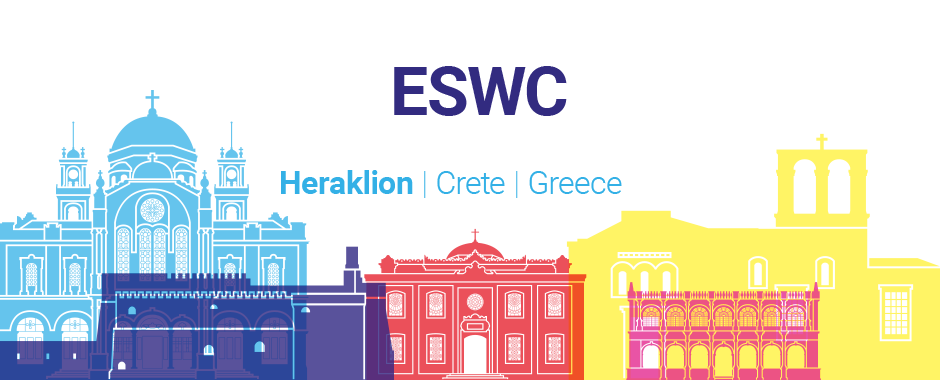Program
Day 1 – May 28th 2023
| Time | Orpheas | Hermes | Erato | Polymnia & Kalia | Melpo & Thalia |
|---|---|---|---|---|---|
| 09:00 – 10:30 | Trusting Decentralised KGs on the Web (TrusDeKW) | Knowledge Graph Construction | First International Biochemical Knowledge Extraction Challenge [Bike] Challenge | Linked Data-driven Resilience Research (D2R2) | [Tutorial] SciKG: Building Scientific Knowledge Graphs from Data, Data Dictionaries, and Codebooks |
| 10:30 – 11:00 | Coffee Break | ||||
| 11:00 – 12:30 | TrusDeKW | Knowledge Graph Construction | Bike Challenge | D2R2 | [Tutorial] SciKG |
| 12:30 – 14:00 | Lunch | ||||
| 14:00 – 15:30 | TrusDeKW | Knowledge Graph Construction | Semantic Technologies for Scientific, Technical and Legal Data (SemTech4STLD) | Semantic Web on Constrained Things (SWoCoT) | [Tutorial] SciKG |
| 15:30 – 16:00 | Coffee Break | ||||
| 16:00 – 18:00 | TrusDeKW | Knowledge Graph Construction | SemTech4STLD | SWoCoT | [Tutorial] SciKG |
Day 2 – May 29th 2023
| Time | Efterpi | Hermes | Orpheas | Erato | Polymnia & Kalia | Melpo & Thalia |
|---|---|---|---|---|---|---|
| 09:00 – 10:30 | Semantic Web solutions for large-scale biomedical data analytics (SeWeBMeDA) | Knowledge graph generation from text (TEXT2KG) | PhD Symposium | Starting 8:30 Metadata and research management for linked open science (DaMaLOS) | ||
| 10:30 – 11:00 | Coffee Break | |||||
| 11:00 – 12:30 | SeWeBMeDA | TEXT2KG | PhD Symposium | DaMaLOS | ||
| 12:30 – 14:00 | Lunch | |||||
| 14:00 – 15:30 | SeWeBMeDA | TEXT2KG | PhD Symposium | Data Management for Knowledge Graphs (DMKG) | Semantic Methods for Events and Stories (SEMMES) | [Tutorial] Beginner’s Guide to Reasoning: How to reason your way to better data |
| 15:30 – 16:00 | Coffee Break | |||||
| 16:00 – 18:00 | SeWeBMeDA | TEXT2KG | PhD Symposium | DMKG | SEMMES | [Tutorial] Beginner’s Guide to Reasoning |
Workshops
Semantic Technologies for Scientific, Technical, and Legal Data
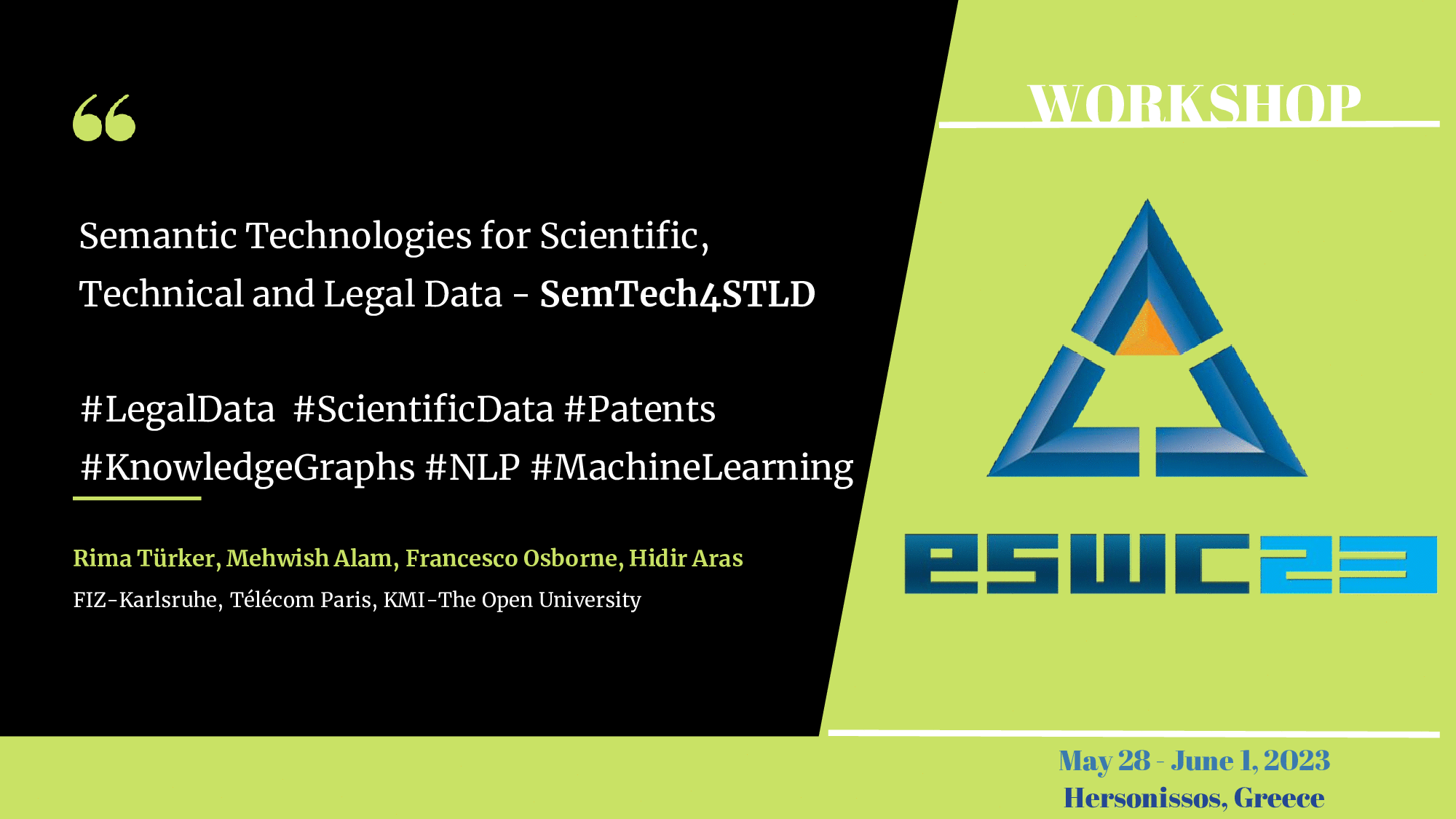
Organizers: Rima Türker – FIZ-Karlsruhe (Germany), Mehwish Alam – Télécom Paris (France), Francesco Osborne – The Open University, Milton Keynes (United Kingdom), Hidir Aras – FIZ-Karlsruhe (Germany)
Link: https://rima-turker.github.io/SemTech4STLD/
The rapid growth of online available scientific, technical, and legal data such as patents, reports, articles, etc. has made the large-scale analysis and processing of such documents a crucial task. Today, scientists, patent experts, inventors, and other information professionals (e.g., information scientists, lawyers, etc.) contribute to this data every day by publishing articles, writing technical reports, or patent applications. It is challenging to process, analyze, and explore these documents due to their length, the use of domain-specific vocabulary, and the complexity introduced by targeting various scientific fields and domains. These semi-structured documents cover unstructured textual parts and structured parts such as tables, mathematical formulas, diagrams, and domain-specific information such as chemical names, bio-sequences, etc. Such kind of information brings complexity in processing such documents. This workshop aims to provide an opportunity to discuss the use of the technologies around Semantic Web Technologies, Natural Language Processing (NLP) techniques, and Deep Neural Networks (DNN) to address the challenges mentioned above.
Trusting Decentralised Knowledge Graphs and Web Data Workshop – TrusDeKW
Organizers: Juan Cano – Universidad Politécnica de Madrid (Spain), John Domingue – The Open University (UK), Sabrina Kirrane – Vienna University of Economics and Business (Austria), Philipp D. Rohde – TIB Leibniz Information Centre for Science and Technology and Leibniz University Hannover (Germany), Aisling Third – The Open University (UK), Ruben Taelman – Ghent University (Belgium).
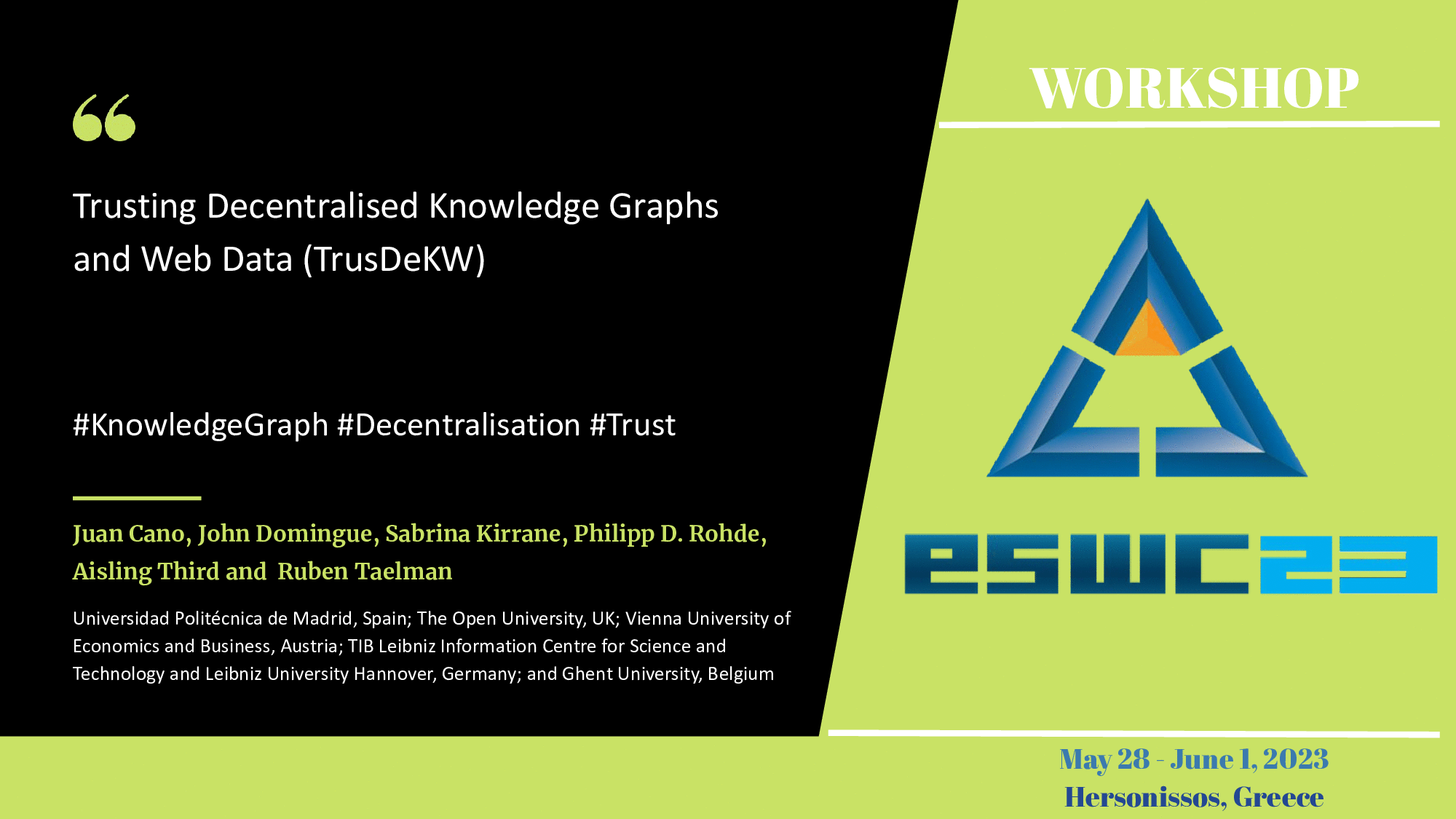
Link: https://events.kmi.open.ac.uk/trusting-decentralised-knowledge-graphs-and-web-data/#eswc
Knowledge Graphs have become a foundation for sharing data on the web and building intelligent services across many sectors and within some of the most successful corporations in the world. The over centralisation of data on the web, however, has been raised as a concern by several prominent researchers in the field. Data centralisation can lead to a number of problems including lock-in/siloing effects; lack of user control over their personal data; limited incentives and opportunities for interoperability and openness; and the resulting detrimental effects on privacy and innovation.
A number of diverse approaches and technologies exist for decentralising data, such as federated querying and distributed ledgers. The main question is, though, what does decentralisation really mean for web data and Knowledge Graphs? What are the main issues and trade-offs involved? How can decentralised approaches best be applied to solve the problems outlined above? Are current techniques sufficient for decentralisation, where are they lacking, and how can we improve them?
This workshop will bring together researchers and stakeholders to explore how we can decentralise data on the web and come to a common understanding of the benefits and issues associated with decentralised KGs. Whilst we will in general take a broad view of decentralised KGs and data, we will treat trust as a key issue as a) trust is a special concern for the wider community when it comes to information and data on the web, and b) trust (and verification and validation) becomes an issue when data is decentralised.
Workshop: Semantic Methods for Events and Stories – SEMMES
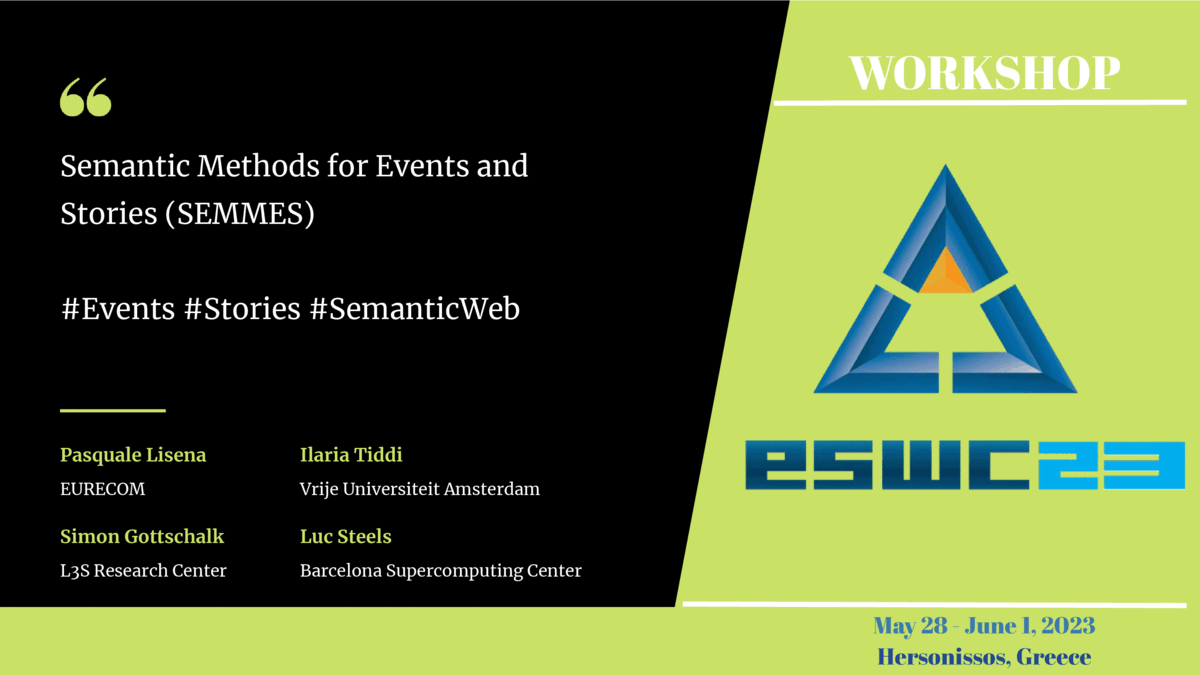
Organizers: Pasquale Lisena – EURECOM (France), Ilaria Tiddi – Vrije Universiteit Amsterdan (the Netherlands), Simon Gottschalk – L3S Research Center, Leibniz Universität Hannover (Germany), Luc Steels – Barcelona Supercomputing Center (Spain)
Link: https://anr-kflow.github.io/semmes/
An important part of human history and knowledge is made of events, which can be aggregated and connected to create stories, be they real or fictional. These events as well as the stories created from them can typically be inherently complex, reflect societal or political stances and be perceived differently across the world population. The Semantic Web offers technologies and methods to represent these events and stories, as well as to interpret the knowledge encoded into graphs and use it for different applications, spanning from narrative understanding and generation to fact-checking.
The aim of SEMMES is to offer an opportunity to discuss the challenges related to dealing with events and stories, and how we can use semantic methods to tackle them. We welcome approaches which combine data, methods and technologies coming from the Semantic Web with methods from other fields, including machine learning, narratology, or information extraction. This workshop wants to bring together researchers working on complementary topics, in order to foster collaboration and sharing of expertise in the context of events and stories.
6th International Workshop on Semantic Web solutions for large-scale biomedical data analytics – SeWeBMeDA-2023
Organizers: Ali Hasnain and Tracy Robson – School of Pharmacy and Biomolecular Sciences, Royal College of Surgeons (Ireland), Michel Dumontier – Maastricht University (the Netherlands), Alba Morales Tirado – The Open University (UK), Dietrich Rebholz-Schuhmann – Cologne University (Germany)
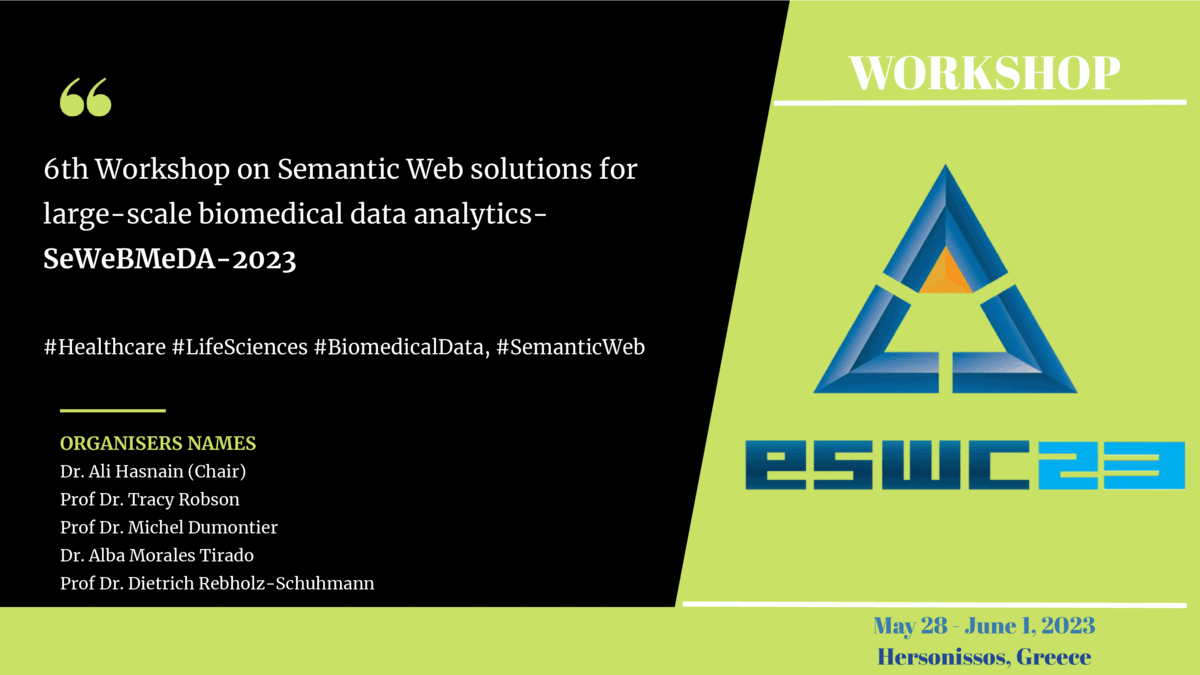
Link: https://sites.google.com/view/sewebmeda-2023/home
The life sciences domain has been an early adopter of linked data and a considerable portion of the Linked Open Data cloud is composed of life sciences data sets. The deluge of in-flowing biomedical data, partially driven by high-throughput gene sequencing technologies, is a key contributor to these developments. The available datasets require integration according to international standards, large-scale distributed infrastructures, specific techniques for data access, and offer data analytics benefits for decision support.
With Semantic Web and Linked Data technologies, the promise to enable the processing of large as well as semantically heterogeneous data sources for capturing new knowledge becomes easier. In this workshop, we invite papers for life sciences and biomedical data processing with the amalgamation of Linked Data and Semantic Web technologies for better data analytics, knowledge discovery, and user-targeted applications. The submitted research should aim to provide novel contributions to Knowledge Acquisition in the research community as well as the working Data Scientist.
Fourth International Workshop on Knowledge Graph Construction
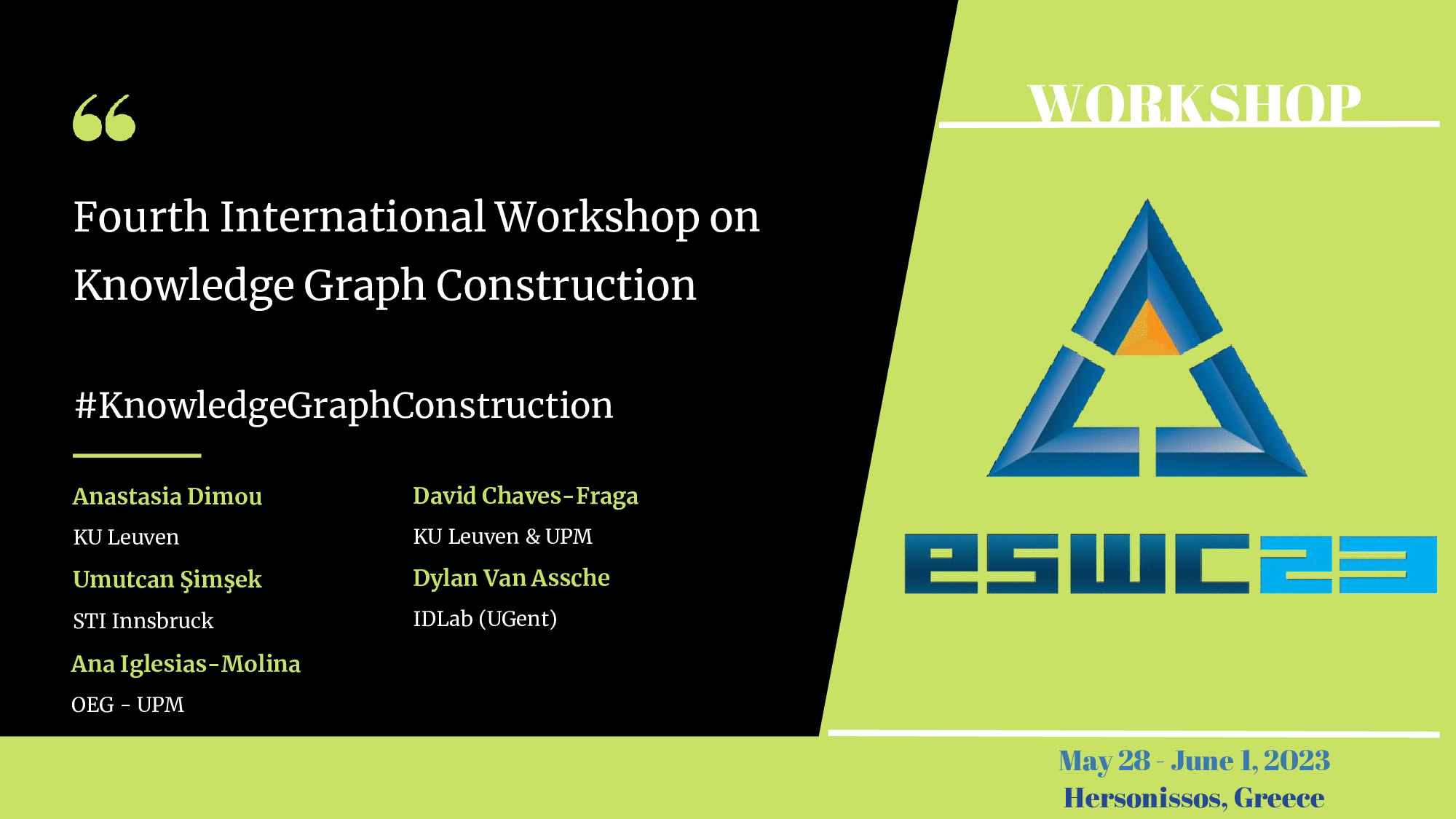
Organizers: Anastasia Dimou – KULeuven (Belgium), David Chaves-Fraga – UPM, KULeuven (Belgium), Umutcan Şimşek – STI Innsbruck (Austria), Dylan Van Assche – imec-UGent (Belgium), Ana Iglesias-Mollina – UPM (Spain)
Link: https://w3id.org/kg-construct/workshop/2023
More and more knowledge graphs (KGs) are constructed for private use, e.g., Google, or public use, e.g. DBpedia, and Wikidata. While many solutions were proposed to construct KGs from existing data on the Web, there is still no systematic evaluation to compare the performance and resource usage of the different systems independently of the mapping language they use or the way they construct the knowledge graph (materialization or virtualization). Addressing the challenges related to KG construction requires both the investigation of theoretical concepts and the development of systems and methods for their evaluation. The Knowledge Graph Construction Workshop (KGCW) has a special focus this time on the efficiency of the systems during the construction of knowledge graphs, exploring the trade-offs between different approaches (e.g., planification VS physical operators). The workshop includes a keynote and a panel, as well as (research, in-use, experience, position, tools) paper presentations, demo jam, and break-out discussions. In particular this year, we aim to provide an evaluation setup to the workshop participants to compare the different tools for KG construction. Our goal is to provide a venue for scientific discourse, systematic analysis, and rigorous evaluation of languages, techniques, and tools, as well as practical and applied experiences and lessons learned for constructing knowledge graphs from academia and industry. The workshop complements and aligns with the activities of the W3C Community Group on KG construction.
1st International Workshop on Data Management for Knowledge Graphs – DMKG 2023
Organizers: Christian Aebeloe – Aalborg University (Denmark), Amr Azzam – WU Vienna (Austria), Olaf Hartig – Linköping University (Sweden), Katja Hose – Aalborg University (Denmark)
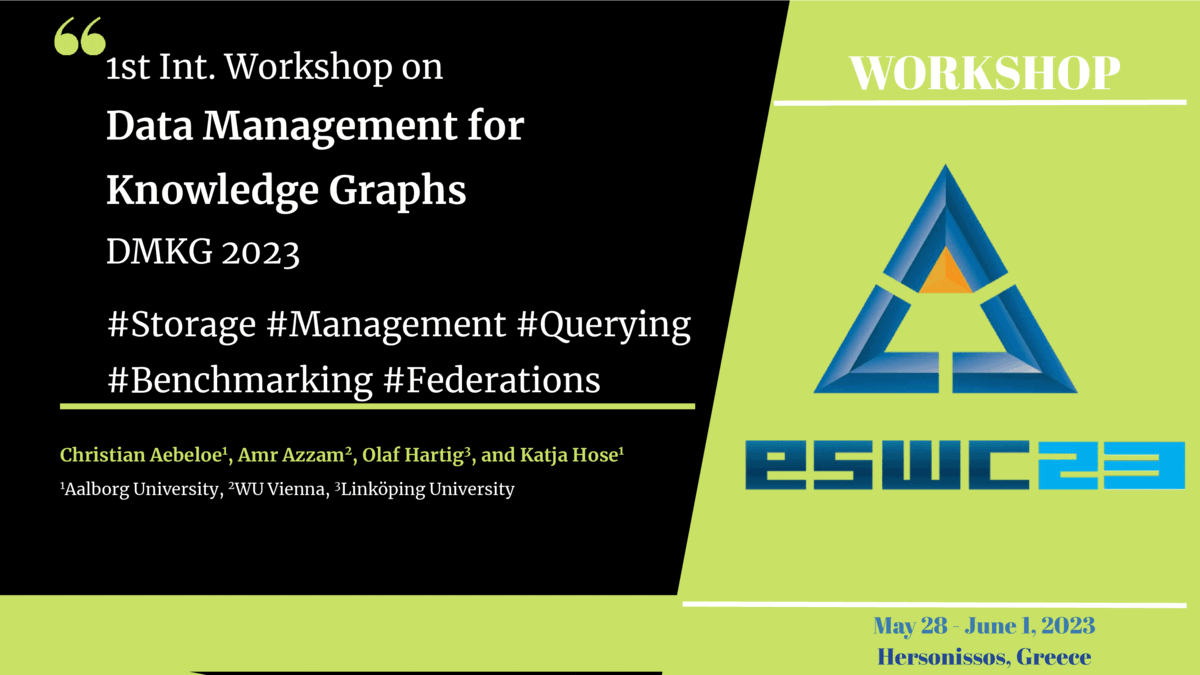
Link: https://dmkg-workshop.github.io/
The rapid increase in the adoption of knowledge graphs over the past years, both in the open data domain as well as the industry, means that data management solutions for knowledge graphs today have to support ever increasing amounts of data. The continuously growing KGs resulting from the increasing popularity of semantic technologies highlight the necessity for scalable and efficient solutions for the management of knowledge graphs in distributed, federated, and centralized environments.
The DMKG workshop, therefore, invites novel research and advances in scalable data management solutions for large-scale knowledge graphs. Such data management solutions include techniques for storage and indexing, partitioning for decentralized/centralized systems, archiving and versioning, validation with SHACL/shEx, or federated data management. The main goal of the workshop is to bring together both early-stage and established researchers as well as industrial partners in order to facilitate communication and collaboration between partners in different domains on the issues relating to scalable data management techniques for large-scale knowledge graphs.
Workshop on metadata and research management for linked open science – DaMaLOS 2023
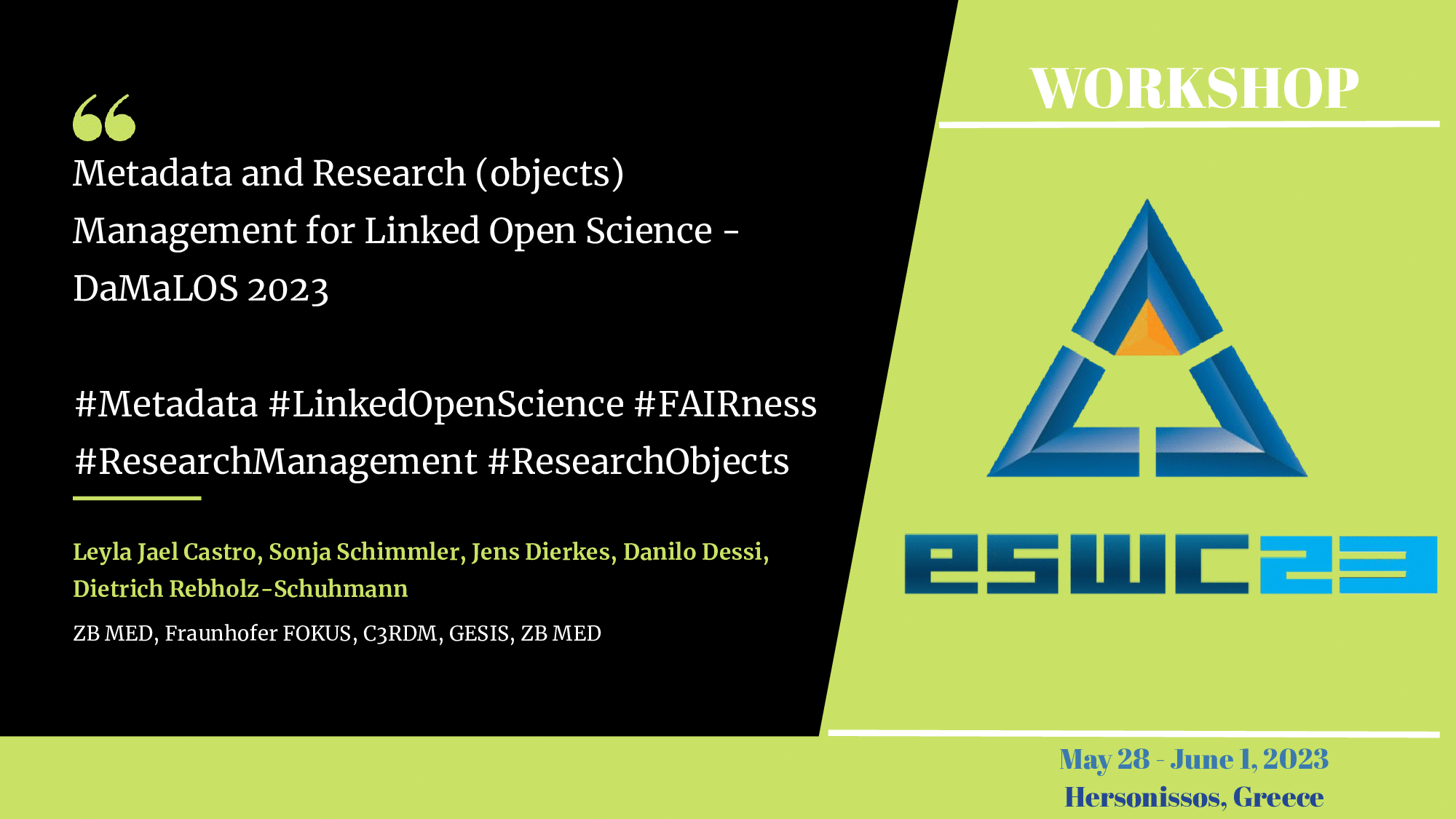
Organizers: Leyla Jael Castro – ZB MED Information Centre for Life Sciences (Germany), Sonja Schimmler – Fraunhofer FOKUS (Germany), Jens Dierkes – Cologne Competence Center for Research Data Management (C3RDM), University of Cologne (Germany), Danilo Dessi – GESIS Leibniz Institute for the Social Sciences (Germany), Dietrich Rebholz-Schuhmann – ZB MED Information Centre for Life Sciences, Univeristy Of Cologne (Germany)
Link: https://zbmed.github.io/damalos/
Scientific research involves various digital objects including publications, software, data, workflows, and tutorials, all key to FAIRness, reproducibility, and transparency. The research lifecycle, from questions and hypotheses to results and conclusions, requires data production, collection, and transformation, a process commonly supported by software and workflows. For this cycle to prosper, we require Research Data and Software Management Plans (DMPs and SMPs), Research Objects packing things together, and metadata supporting the FAIR (data) principles and its extensions (e.g., software, and workflows) as well as coverage for reproducibility, transparency, trustability, explainability, i.e., *ilities. Furthermore, despite playing an important role, data on its own is not enough to establish Linked Open Science, i.e., Open Science plus Linked Open Data (LOD). LOD principles, aka LOD 5 stars, follow objectives overlapping with FAIR and Open Science (e.g., LOD includes “openness” and usage of “non-proprietary open formats”). In DaMaLOS we will explore requirements for research digital objects and their corresponding management plans to effectively instantiate an integrated layer supporting Linked Open Science. DaMaLOS welcomes contributions aligned to the following topics: machine-actionable DMPs and SMPs; machine/deep learning approaches around rich metadata; FAIRification; FAIR by design; FAIR tooling; recognition, publication, and citation for data, software, and other research digital objects, and scientometrics beyond the scholarly publication (i.e., combining the different digital objects playing a role in the research cycle).
First International Workshop on Semantic Web on Constrained Things – SWoCoT
Organizers: Ghislain Atemezing – Mondeca, Paris (France), Lionel Medini – Liris Lab, Université Lyon 1 (France), Frédérique Laforest INSA Lyon (France)
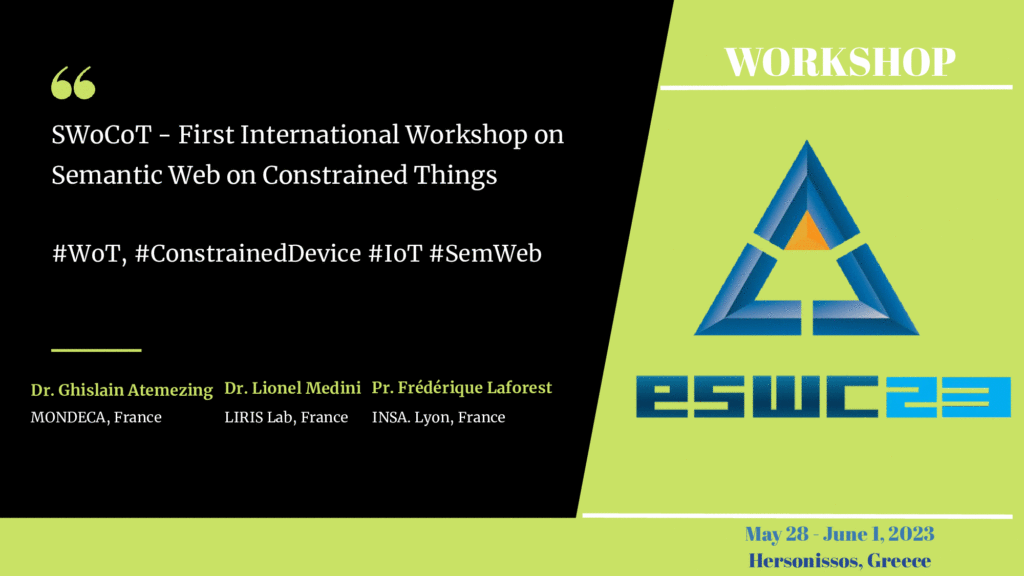
Link: https://mondecalabs.github.io/SWoCoT23/
In recent years, the combination of the Internet of Things (IoT), Semantics, and Web of Things (SWoT) have been more and more popular to collect sensing data according to the semantic web stack and build smart services and applications. One momentum is the release by the W3C of a recommendation for WoT architecture using the formal description of a Thing. The Web of Things (WoT) allows to describe the devices semantics, bridging the gap between the different domain and service descriptions. Developers can use the techniques of WoT to collect the sensing data and control the devices via different IoT standards and specifications for the applications of agriculture, energy, enterprise, finance, healthcare, industry, etc.
At the same time, the need for decentralized infrastructure to capture and transform data on the edge has gained attraction due to the real necessity to reduce the global carbon emission of centralized architecture. A step towards the so-called Green Web.
The goal of this first international workshop is to gather both academia and industry working at the intersection of IoT, semantic technologies, and embedded systems to discuss the recent developments, tools, and techniques of embedding a semantic web stack in constrained devices.
Second International Workshop on Linked Data-driven Resilience Research 2023 – D2R2’23
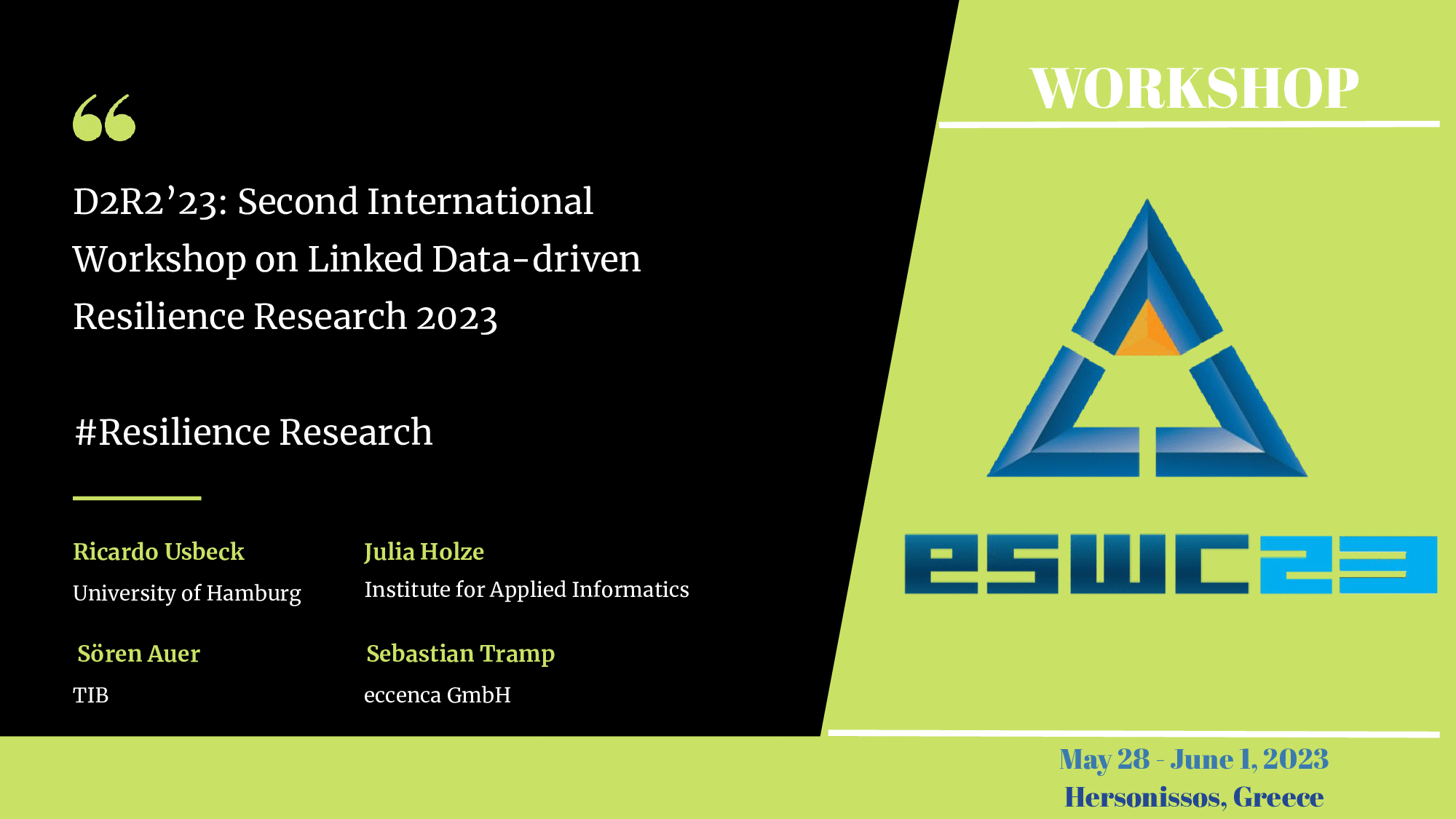
Organizers: Ricardo Usbeck – University of Hamburg (Germany), Sören Auer – TIB (Germany), Julia Holze – InfAI e.V. (Germany), Sebastian Tramp – eccenca GmbH, Agile Knowledge Engineering and Semantic Web (Germany), Natanael Arndt – eccenca GmbH, Agile Knowledge Engineering and Semantic Web (Germany)
Link: https://d2r2.aksw.org/
In the face of continuously changing contextual conditions and ubiquitous disruptive crisis events, the concept of resilience refers to some of the most urgent, challenging, and interesting issues of nowadays society. Recent crises like the Covid-19 pandemic wave and the Russia-Ukraine War have not only tested supply chains and economic value networks to their limits but revealed the need to increase flexibility of technical infrastructures, energy supply, health systems, and social textures alike. Currently, many economic and social spheres are continuously challenged by recession fear, political ploys, and weather disasters to unfold capacities to withstand as well as refine and transform themselves to stay ahead of changes.
Semantically represented data can play a crucial role in increasing the transparency of value chains and understanding the complex mechanisms of crisis factors on a global level. The systematic integration, KI-based modeling, and analysis of huge amounts of data from various sources can build a new basis for situational awareness and decision making as well as for the elaboration of advanced resilience strategies.
The D2R2’23 workshop, which is organized by the CoyPu project (https://coypu.org/), will provide an open forum to exchange current issues, ideas, and trends in the area of Data-driven Resilience Research. The workshop will bring together scientists, software engineers, resilience practitioners, and domain experts in order to approach the topic from a multi-disciplinary perspective. Ongoing technological developments, current research approaches as well as use case scenarios, and field reports will be presented and discussed with a broad specialist audience. We invite contributions of novel results and ongoing work as well as position papers focusing on various aspects of Data-driven Resilience Research from a scientific or practical perspective.
Knowledge Graph Generation from Text – TEXT2KG
Organizers: Sanju Tiwari – Universidad Autonoma de Tamaulipas (Mexico), Nandana Mihindukulasooriya – IBM Research, Dublin (Ireland), Francesco Osborne – KMi, The Open University (UK), Dimitris Kontokostas – Diffbot (Greece), Jennifer D’Souza – TIB (Germany), Mayank Kejriwal – University of Southern California (USA)
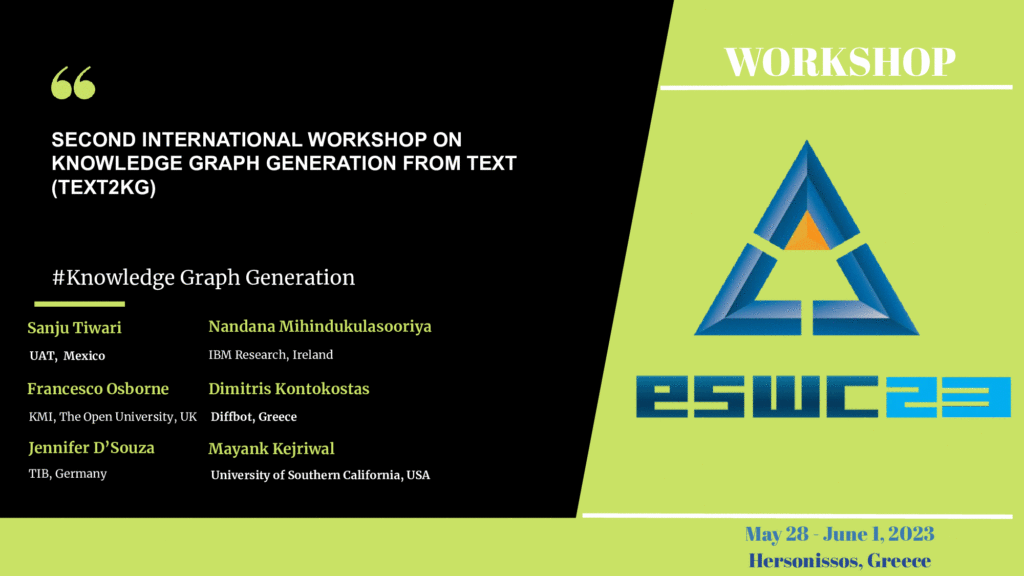
Link: https://aiisc.ai/text2kg2023/
Knowledge Graphs are getting traction in both academia and in the industry as one of the key elements of AI applications. They are being recognized as an important and essential resource in many downstream tasks such as question answering, recommendation, personal assistants, business analytics, business automation, etc. Even though there are large knowledge graphs built with crowdsourcing such as Wikidata or using semi-structured data such as DBpedia or Yago or from structured data such as relational databases, building knowledge graphs from text corpora still remains an open challenge.
The workshop welcomes a broad range of papers including full research papers, negative results, position papers, dataset, and system demos examining the wide range of issues and processes related to knowledge graphs generation from text corpora including, but not limited to entity linking, relation extraction, knowledge representation, and Semantic Web. Papers on resources (methods, tools, benchmarks, libraries, datasets) are also welcomed.
4th International Workshop on Deep Learning meets Ontologies and Natural Language Processing – canceled
Organizers: Sarra Ben Abbès – Engie (France), Rim Hantach – Engie (France)
Link: https://sites.google.com/view/deepontonlp2023/
In recent years, deep learning is applied successfully and achieved state-of-the-art performance in a variety of domains, such as image analysis. Despite this success, deep learning models remain hard to analyze data and understand what knowledge is represented in them, and how they generate decisions.
Deep Learning (DL) meets Natural Language Processing (NLP) to solve human language problems for further applications such as information extraction, machine translation, search, and summarization. Previous works have attested to the positive impact of domain knowledge on data analysis and vice versa, for example pre-processing data, searching data, redundancy and inconsistency data, knowledge engineering, domain concepts, and relationships extraction, etc. Ontology is a structured knowledge representation that facilitates data access (data sharing and reuse) and assists the DL process as well. DL meets recent ontologies and tries to model data representations with many layers of non-linear transformations. The combination of DL, ontologies, and NLP might be beneficial for different tasks:
- Deep Learning for Ontologies: ontology population, ontology extension, ontology learning, ontology alignment, and integration,
- Ontologies for Deep Learning: semantic graph embeddings, latent semantic representation, hybrid embeddings (symbolic and semantic representations),
- Deep Learning for NLP: summarization, translation, named entity recognition, question answering, document classification, etc.
- NLP for Deep Learning: parsing (part-of-speech tagging), tokenization, sentence detection, dependency parsing, semantic role labeling, semantic dependency parsing, etc.
Tutorials
A Beginner’s Guide to Reasoning: How to reason your way to better data
Presenter: Valerio Cocchi, Senior Knowledge Engineer at Oxford Semantic Technologies
Reasoning has become an increasingly valued tool in the semantic web space, and yet to many it’s still a black box solution. Perhaps more tragically, despite the explosion of its development in recent years, many in the space still perceive it as a slow, cumbersome, and ultimately impractical technology, which is far from true today. Whether you’re looking to harness reasoning for your own goals, or to peek behind the curtains of someone else’s solution, now is your time to learn. Get hands on with a reasoning engine in this interactive walkthrough: A Beginner’s Guide to Reasoning. You’ll come away understanding the power of reasoning, what it can add to your data, and the fundamentals of how to apply it yourself. With technology in this space running away, there’s never been a better time to learn! This tutorial will touch on the basics of SPARQL, OWL, and Datalog, before diving into reasoning at a technical level. Each participant will come away having built a reasoning solution for themselves, guided along the way by knowledge engineers and subject experts. No prior knowledge is required.
SciKG: Building Scientific Knowledge Graphs from Data, Data Dictionaries, and Codebooks
Organizers: Henrique Santos – Rensselaer Polytechnic Institute (USA), Paulo Pinheiro – Parcela Semântica (Portugal), Jamie P. McCusker – Rensselaer Polytechnic Institute (USA), James Masters – Icahn School of Medicine at Mount Sinai (USA), Sabbir M. Rashid – Rensselaer Polytechnic Institute (USA), Deborah L. McGuinness – Rensselaer Polytechnic Institute (USA)
Link: https://tetherless-world.github.io/scikg-eswc-2023/
Data from scientific studies are published in datasets, typically accompanied by data dictionaries and codebooks to support data understanding. The data acquisition methods may also be described in additional documentation to support reproducibility. To conduct rigorous analysis, data users need to leverage this documentation to correctly interpret the data. While this process can be burdensome for new data users, it is also prone to errors even for seasoned users. A computational formal model of the knowledge that was used to create the study can facilitate better understanding and thus improved usage of the study data. Knowledge graphs can be used effectively to capture this study’s knowledge. This tutorial aims to introduce participants to the basics of knowledge graph construction using data, data dictionaries, and codebooks from scientific studies. It will use the Center for Disease Control and Prevention’s (CDC) National Health and Nutrition Examination Surveys (NHANES) data as a testbed and introduce standardized terminology, novel, and established techniques, and resources such as scientific/biomedical ontologies, semantic data dictionaries, and knowledge graph frameworks in both lecture and practical sessions. By the end of the tutorial, participants will have created a small knowledge graph that can be accessed to retrieve study knowledge and data.
Big Data Analytics for Semantic Data – canceled
Organizers: Charalampos Chelmis – University of Albany (USA), Bedirhan Gergin – University of Albany (USA)
Link: https://www.cs.albany.edu/~cchelmis/tutorials/eswc/2023/
Researchers, scientists and companies alike increasingly leverage semantically enriched, linked datasets to train machine learning models for tasks ranging from discovering new vaccines and materials, to recommending products and services, to building virtual personal assistants. At the same time, big-data analytics engines are increasingly adopted to store and process the ever increasing volumes of data efficiently at scale. Until recently however, the Semantic Web, big data analytics and machine learning communities were separated, since big-data analytics engines could not process Knowledge Graphs (KGs).
This tutorial aims to provide an up to date overview of recent advances that allow end to end processing pipelines to be constructed so that analytics and machine learning tasks can be performed without the need for intermediate, computationally expensive and/or time consuming data transfers and/or transformations. Hands on activities covering statistical analytics and inferencing over KGs, using simple use cases will be provided.
